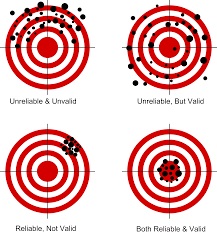“Measure twice. Cut once!” goes the old carpenter adage. Why? Because measuring accurately means you’ll get the outcomes you want!

Same in research. A consistent and accurate measurement will get you the outcomes you want to know. Whether an instrument measures something consistently is called reliability. Whether it measures accurately is called validity. So, before you use a tool, check for its reported reliability and validity.
A good resource for understanding the concepts of reliability (consistency) and validity (accuracy) of research tools is at https://opentextbc.ca/researchmethods/chapter/reliability-and-validity-of-measurement/ Below are quoted Key Takeaways:
- Psychological researchers do not simply assume that their measures work. Instead, they conduct research to show that they work. If they cannot show that they work, they stop using them.
- There are two distinct criteria by which researchers evaluate their measures: reliability and validity. Reliability is consistency across time (test-retest reliability), across items (internal consistency), and across researchers (interrater reliability). Validity is the extent to which the scores actually represent the variable they are intended to.
- Validity is a judgment based on various types of evidence. The relevant evidence includes the measure’s reliability, whether it covers the construct of interest, and whether the scores it produces are correlated with other variables they are expected to be correlated with and not correlated with variables that are conceptually distinct.
- The reliability and validity of a measure is not established by any single study but by the pattern of results across multiple studies. The assessment of reliability and validity is an ongoing process.



